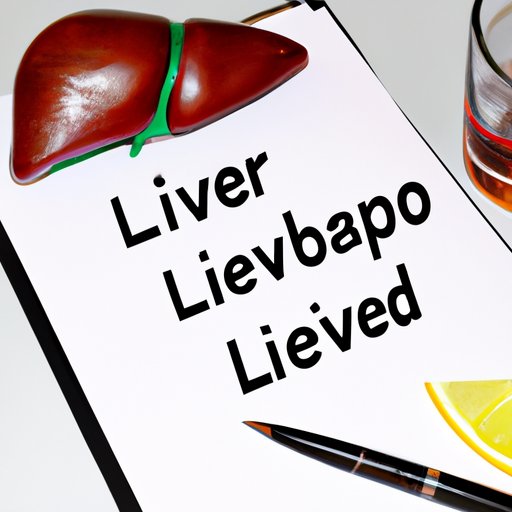Introduction
Liver health is crucial for overall well-being, as the liver is responsible for filtering toxins, regulating metabolism, and producing essential proteins. Unfortunately, liver disease often goes undetected until it has progressed to a more serious stage. That’s why it’s important to regularly monitor your liver health so you can take preventative measures before it’s too late. This article will provide a comprehensive guide on how you can check your liver health at home and make lifestyle changes to promote liver health.
Liver Function Tests
Liver function tests, also known as liver enzyme tests, are blood tests that measure various enzymes and proteins in your blood that are created by or processed through the liver. These tests are typically done in a doctor’s office, but some can be done at home with a kit that you can order online. Some of the most common liver function tests are the alanine transaminase (ALT) test, aspartate transaminase (AST) test, and alkaline phosphatase (ALP) test.
The ALT and AST tests measure liver enzymes that are elevated when liver cells are damaged or inflamed. Elevated ALP levels may indicate bile duct blockages, bone disorders, or liver disease. While these tests can give you an idea of the overall health of your liver, it’s important to talk to your doctor about which tests are appropriate for you and to interpret the results.
Physical Exams
Aside from blood tests, you can also monitor your liver health through regular self-examination. Some physical signs and symptoms of liver disease include yellowing of the skin or eyes, abdominal swelling, fatigue, nausea, and dark urine. It’s important to note that not all liver disease presents with physical symptoms, so regular blood tests are also crucial.
If you do notice any concerning signs or symptoms, it’s important to seek medical attention right away. Liver disease can progress quickly and, in some cases, can be life-threatening.
Dietary Changes
What you eat can also impact your liver health. Eating a well-balanced diet that includes plenty of fruits, vegetables, and whole grains can help promote liver health. In particular, foods that are high in antioxidants, such as berries and leafy greens, can help reduce inflammation and oxidative stress in the liver.
On the other hand, consuming too much sugar, saturated fats, and processed foods can harm the liver and contribute to conditions such as non-alcoholic fatty liver disease. It’s important to limit your intake of these foods and focus on whole, nutrient-dense foods instead.
If you’re looking to make dietary changes to promote liver health, consider consulting with a registered dietitian who can help create a personalized meal plan for you.
Alcohol Intake
Excessive alcohol consumption is one of the leading causes of liver disease. When you drink, the liver works to break down and eliminate alcohol from your body. Over time, excessive alcohol intake can cause scarring and inflammation in the liver, leading to conditions such as cirrhosis and alcoholic liver disease.
If you’re looking to promote liver health, it’s important to limit or stop drinking alcohol altogether. If you’re struggling to cut back on your own, consider reaching out to a support group or alcohol treatment center for help.
Exercise
Regular exercise can also help promote liver health. Exercise can help reduce inflammation in the body and improve insulin sensitivity, both of which can benefit the liver. Aim to get at least 30 minutes of moderate-intensity exercise most days of the week.
Some exercises that you can do at home include walking, dancing, cycling, or doing bodyweight exercises. The most important thing is to find an exercise routine that you enjoy and can stick to.
Supplements
There are also some supplements that may benefit liver health. Milk thistle, for example, has been shown to have anti-inflammatory and antioxidant properties that can help protect the liver. Turmeric is another supplement that may help reduce liver inflammation.
While these supplements can be beneficial, it’s important to note that they should not replace a healthy lifestyle. Additionally, some supplements may interact with medications or have other potential risks. It’s important to talk to your doctor before starting any new supplements.
Conclusion
Monitoring your liver health is an important part of overall wellness. By undergoing regular liver function tests, monitoring for physical signs and symptoms, making dietary and lifestyle changes, limiting alcohol intake, and exercising regularly, you can help protect your liver from disease and promote optimal health. Remember to talk to your doctor about any concerns you may have and to seek medical attention right away if you notice any concerning signs or symptoms.
Sources:
